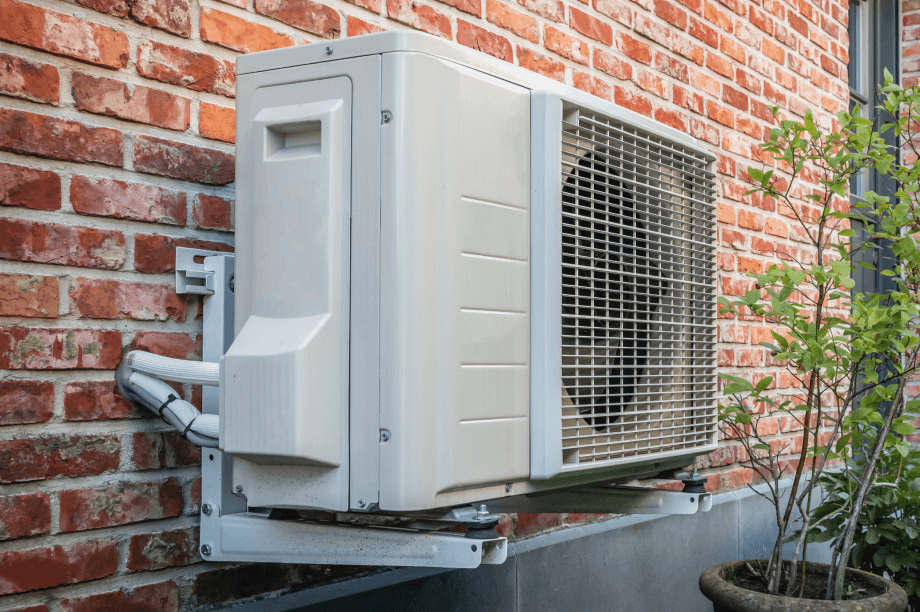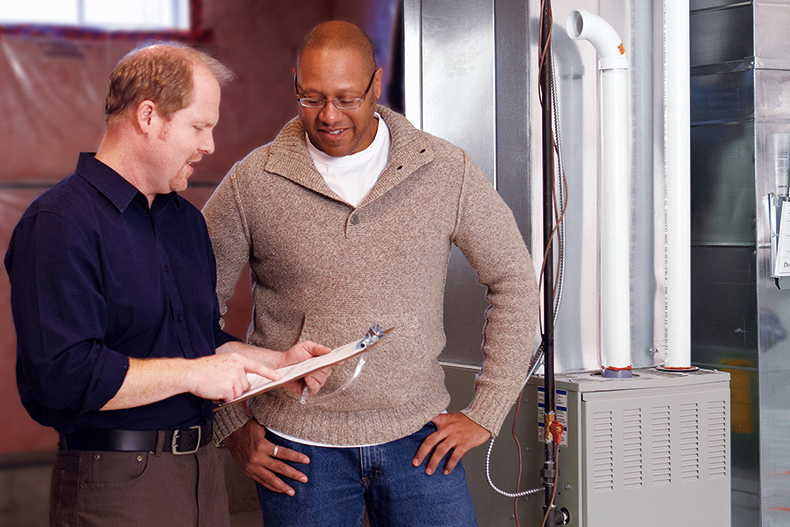
Air Source Heat Pump Buying Guide
Heat pumps are growing in popularity—but are they right for your home? Use this guide to learn all about heat pumps before you buy.
Energy efficient and environmentally friendly, air source heat pumps are becoming an increasingly popular option to heat and cool homes. This guide will help you understand how heat pumps work, get familiar with their features and ask the right questions to decide if you should make the switch.
Why should I consider a heat pump?
A heat pump is an all-in-one heating, ventilation and air conditioning (HVAC) solution for every season. It’s a high-efficiency system that extracts heat energy from the air and moves it either inside or outside your home.
If you’re considering making the switch to a heat pump, here are some key benefits to keep in mind.
They are energy efficient
Moving heat takes a lot less energy than generating it. This is why heat pumps are much more efficient than systems that use combustion to produce heat (such as burning oil, gas or propane), or that generate heat through electric resistance (such as electric baseboards or electric furnaces).
They are versatile
Heat pumps don’t just heat. They also cool, dehumidify and filter dust and allergens from the air—keeping your home comfortable year round.
They are environmentally sustainable
Heat pumps use less energy, which means lower greenhouse gas emissions, making them an HVAC option that’s better for the planet.
They are cost-effective
A more energy-efficient heating and cooling system can put more money in your pocket. When switching to a heat pump, your energy savings will depend on many factors, such as the overall energy efficiency of your home, what type of system you’re switching from, and more. Your HVAC contractor should be able to help you make an informed decision about the most cost-effective choice for your home.
They are flexible
Multi-zone heat pump systems can keep different rooms in your home at different temperatures. And with both ducted and ductless varieties, air source heat pumps are flexible enough to work in most homes to ensure maximum comfort.
Types of heat pumps
While this guide focuses on air source heat pumps, there are different types of heat pumps, depending on what source they absorb heat from.
Air source heat pumps
- Absorb and transfer heat from the air.
- Are the most common type of heat pump for residential HVAC.
- Come in both ducted and ductless varieties.
Geothermal/ground-source heat pumps
- Absorb and transfer heat from the ground.
- Benefit from a consistent underground temperature.
- Require complex and potentially expensive excavation to install.
Water-source heat pumps
- Absorb and transfer heat from a nearby body of water, such as a lake or pond.
Air-to-water heat pumps
- Absorb and transfer heat from the air into radiators or in-floor heating.

How do air source heat pumps work?
Air source heat pumps are the most common heat pump choice for residential heating and cooling. Here’s how they work.
A typical air source heat pump is made up of an outdoor unit connected to an indoor unit by a refrigerant line. In the winter, the outdoor unit draws in air, absorbs its heat and transfers it to a refrigerant fluid. A combination of temperature and pressure transforms this fluid into a gas. The gas then passes through a compressor to increase its temperature further, and the resulting heat is transferred into your home, either directly from the unit or through ductwork.
This process reverses in the summer. The heat pump absorbs heat from inside your home and transfers it to the outdoors, becoming a high-efficiency air conditioner and dehumidifier.
Worried about Ontario winters?
While standard air source heat pumps tend to lose heating capacity when temperatures dip below zero, cold climate air source heat pumps are specially designed to work in temperatures as low as -25°C.
What to consider before buying
If you’re considering an air source heat pump for your home, there are a few important questions to ask yourself.
What’s involved in making the switch?
Installing a heat pump is more complex than simply replacing your existing furnace, boiler, baseboards, or other HVAC system. It may involve modifying ductwork and wiring, as well as finding space for an outdoor condensing unit.
If you live in an older home, you should install other energy-efficiency measures first to reduce your heating load. This could include new insulation, air sealing and more. By limiting heat loss from air leaks or thin insulation, you’ll get the most out of your heat pump and may even be able to opt for a smaller, more affordable unit.
Ducted or ductless?
A ducted heat pump works in a similar way to a central furnace. It’s connected to interior ductwork and controlled by a central thermostat. Warm or cool air travels through the ducts and into your home.
A ductless heat pump emits warm or cool air directly from an indoor unit mounted to the wall or floor. Depending on the size and layout of your home, you may need more than one indoor unit.
You might want to opt for a ductless heat pump if you:
- Live in a home with no existing ductwork.
- Want to have flexibility in heating and cooling in multiple areas of your home.
- Need supplemental heating and cooling in a particular area, such as a home addition.
Standalone or hybrid?
As the outside air temperature drops, the heat pump has to work harder, gradually reducing its efficiency and heating capacity. Some homeowners opt for hybrid systems, with a conventional furnace or boiler acting as a backup to a primary air source heat pump. Some choose to install cold climate air source heat pumps, which are specially designed to work in low outdoor temperatures.
The choice of whether to select a standalone or hybrid HVAC system will be dependent on several factors, such as climate, energy costs, heat loss and home type. A licensed HVAC contractor can help assess your home and identify the most energy-efficient and cost-effective solution for you.
Single stage, two stage or variable stage?
A single-stage heat pump is the most basic system available. It uses a simple on/off cycle that is triggered when the temperature dips below a set point. It tends to be the most costly type of heat pump to run, as the only setting is full speed.
A two-stage heat pump has two settings—high and low—allowing for slightly more precise temperature control.
A variable-stage heat pump is the most advanced system available. It is able to monitor and adjust to a full range of speeds to maintain the desired indoor temperature. Since it only uses as much power as it needs, it is the most energy-efficient option.
Are rebates available?
Be sure to check for provincial or federal programs that offset the cost of energy-efficiency upgrades for homeowners.
Other points to consider
There are many different heat pump manufacturers and models to choose from. Be sure to research specific models to compare:
- Sizing/capacity
- Efficiency rating
- Noise level
- Fan modes and more
Did you know?
Heat pump technology has been around for a long time. The first air source heat pump was built in 1857 by Austrian scientist Peter von Rittinger.

How to find the right contractor
Replacing your home's HVAC system is a big undertaking. If you’ve decided a heat pump is the right choice for you, the next step is finding a qualified, licensed contractor. They can help you make the best purchasing decision for your home to meet your needs. In Ontario, HVAC contractors must be registered with the Technical Standards and Safety Authority.
Start by getting written estimates from at least three different contractors. Each contractor should:
- Assess the size, construction and layout of your home to calculate heat loss.
- Determine if your ductwork is adequate to meet the air flow needs of new equipment.
- Recommend other energy-efficiency measures to get the most out of your heat pump, such as insulation or air sealing.
- Provide an estimate with information on recommended equipment, warranty, fees for installation and removal of old equipment, etc.
After you’ve hired a contractor and the equipment is installed, make sure you get it inspected annually.



